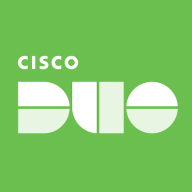

Find out in this report how the two Cisco Security Portfolio solutions compare in terms of features, pricing, service and support, easy of deployment, and ROI.
| Product | Market Share (%) |
|---|---|
| Cisco Duo | 8.0% |
| Cisco Secure Workload | 6.7% |
| Other | 85.3% |


| Company Size | Count |
|---|---|
| Small Business | 31 |
| Midsize Enterprise | 18 |
| Large Enterprise | 40 |
| Company Size | Count |
|---|---|
| Small Business | 5 |
| Midsize Enterprise | 3 |
| Large Enterprise | 8 |
Cisco Duo is a cloud-based identity security platform safeguarding critical resources for any user and device worldwide. Known for its ease of use, Duo offers seamless protection across multi-cloud, hybrid, and on-premises environments.
Cisco Duo is designed to secure access with identity-first protection and provides extensive visibility throughout an organization's identity ecosystem. Offering multi-factor authentication, Duo facilitates easy integration and management, allowing teams to protect data effectively on VPNs, applications, and networks. Its single-pane management improves security processes while enhancing trust, making it suitable for diverse IT infrastructures.
What are the key features of Cisco Duo?
Which benefits and ROI should users consider?
In industries like education and finance, Cisco Duo is widely employed to secure multi-factor authentication across platforms such as email, databases, and servers. Its integration capabilities with Microsoft 365, Active Directory, and VPNs like AnyConnect are instrumental in verifying user identities using mobile apps or OTPs, catering effectively to both remote and on-premise environments.
Cisco Secure Workload is a cloud and data security solution that offers a zero-trust policy of keeping an organization’s application workloads safe and secure throughout the entire on-premise and cloud data center ecosystems.
Cisco Secure Workload will consistently provide protection by discovering workload process anomalies, stopping threats immediately, minimizing the risk threat surface, and aborting any lateral movement.
Today’s ecosystems are very elastic, and in the application-focused dynamic of today’s aggressive marketplace, Cisco Secure Workload delivers a robust security solution that works effectively with today’s most popular applications. The solution uniquely surrounds each and every workload to ensure organizations are able to keep their data, network, and applications safe and secure at all times. Cisco Secure Workload ensures that enterprise organizations can maintain secure applications by consistently building firewalls around every workload level throughout the entire ecosystem. The solution can manage applications that are deployed on containers, virtual machines, or bare-metal servers.
Cisco Secure workload is able to meet an organization's busy needs and offers flexible options such as Software-as-a-Service (SaaS) and on-premises options. Using the Secure Workload SaaS options, users receive all the benefits of Cisco Secure Workload protection without the hassle of having to deploy and maintain the platform on premises. Users are responsible for acquiring the necessary software licensing and deploying software agents. Using SaaS, Secure Workload runs in the cloud and is operated and maintained by Cisco. This option offers the ability to scale easily and is a popular choice for SaaS-first and SaaS-only clients. Many organizations find they get the best TCO and achieve the best productivity and profitability using the SaaS options.
When choosing on-premises options, organizations choose between hardware-based appliance models (large or small form factors). Platform selection is dependent on scalability goals, the desired fidelity level of flow telemetry, and the actual number of workloads. When a user chooses to configure Cisco Secure Workload for a conversation-only flow telemetry for all workloads, each platform has the capability to scale up vertically twice the default platform scale. Additionally, with Secure Workload, it is possible for the platform to be scaled horizontally in order to satisfy the demands of extra large widely distributed enterprise environments using federation capabilities.
Cisco Secure Workload also provides a robust disaster recovery (DR) tool, which helps to make it a complete, comprehensive solution. The DR allows for continuous restore and backup capabilities that enable users to quickly remediate operations and data to a standby cluster in the event of a drastic failure or disaster.
Reviews from Real Users
“The solution offers 100% telemetry coverage. The telemetry you collect is not sampled, it's not intermittent. It's complete. You see everything in it, including full visibility of all activities on your endpoints and in your network. Other valuable features include vast support for annotations, flexible user applications, machine learning, automatic classification, and hierarchical policies.” - CTO at a tech vendor
We monitor all Cisco Security Portfolio reviews to prevent fraudulent reviews and keep review quality high. We do not post reviews by company employees or direct competitors. We validate each review for authenticity via cross-reference with LinkedIn, and personal follow-up with the reviewer when necessary.